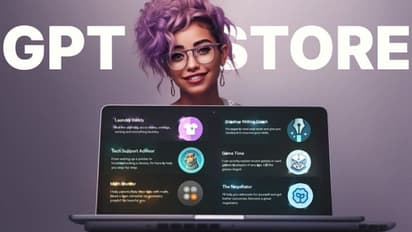Love bytes! OpenAI's GPT store faces ethical dilemma as AI girlfriends flourish

Synopsis
A recent report by Quartz reveals that a quick search for the term "girlfriend" on the GPT Store yields results populated with AI chatbots like "Korean Girlfriend," "Virtual Sweetheart," "Your girlfriend Scarlett," and "Your AI girlfriend, Tsu."
In a surprising turn of events, OpenAI's GPT Store, a marketplace for custom GPTs catering to specific needs, has become a haven for AI girlfriends. The digital realm, it seems, has taken a leap into the affairs of the heart, with virtual companions crafted using OpenAI's advanced language models. While some find this technological twist fascinating, concerns are rising about potential misuse and violation of platform rules.
A recent report by Quartz reveals that a quick search for the term "girlfriend" on the GPT Store yields results populated with AI chatbots like "Korean Girlfriend," "Virtual Sweetheart," "Your girlfriend Scarlett," and "Your AI girlfriend, Tsu." Users engaging with these bots receive prompts such as "What does your dream girl look like?" and "Share with me your darkest secret." The surge of AI girlfriends on the platform highlights a significant departure from the intended use of OpenAI's technology.
OpenAI has explicitly laid out rules for the GPT Store, prohibiting the creation of GPTs dedicated to fostering romantic companionship or engaging in regulated activities. The flood of AI girlfriends on the platform suggests a clear violation of these rules. OpenAI emphasizes that these policies may be enforced automatically during the submission process or retroactively upon further review.
This isn't the first instance of conversational chatbots being repurposed for romantic endeavors. Reflecting on the early days of Siri and Google Assistant, users often posed random, romantic, and sometimes explicit questions without realizing the potential consequences of their interactions. In 2018, Google Assistant reportedly received a staggering 4.5 lakh marriage proposals from India alone.
The recent influx of AI girlfriends on OpenAI's GPT Store echoes a trend observed in 2023, where statistics from mobile app analytics company data.ai indicated that seven out of 30 AI chatbot apps downloaded in the US were related to AI friends, girlfriends, or companions. The allure of virtual companionship appears to be growing, with users seeking unique and personalized interactions.
As technology continues to evolve, so do the creative, and sometimes unexpected, uses of advanced language models like OpenAI's GPT. The surge of AI girlfriends on the GPT Store raises questions about ethical considerations, user intentions, and the need for vigilant monitoring of AI applications. OpenAI faces the challenge of striking a balance between technological innovation and enforcing responsible use, as the digital love affair with AI takes center stage in the 21st century.
Find the latest Technology News covering Smartphone Updates, AI (Artificial Intelligence) breakthroughs, and innovations in space exploration. Stay updated on gadgets, apps, and digital trends with expert reviews, product comparisons, and tech insights. Download the Asianet News Official App from the Android Play Store and iPhone App Store for everything shaping the future of technology.